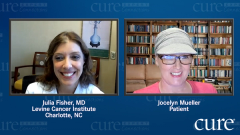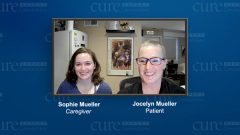
HER2-Positive Breast Cancer: Patient Experience with Support System
Jocelyn Mueller details her experience with her caregiver and the describes the support she received from her community as she continues her journey.
Episodes in this series

Jocelyn Mueller: My caregivers in my house were primarily my husband Mark and my daughter Sophie; my older daughter Lucy is in college; she would come home occasionally. My 2 wonderful labs that are just the greatest company ever. I think 1 of the big things for women in particular and especially if you're a mom, when you go through something like this, when you go through anything, you have this tendency to just keep plowing through and say, "I'm the mom, I have to stay together. I have to do this; I have to take care of this and that." You get hit so hard through this that you really can't keep doing that. You may do it a cycle or 2, but then you're going to realize that you definitely need help, and you have to accept help. People want to help. It's nice to have someone bring you things so you don't have to get up. It gets to a point where getting out of a chair is a chore, and I'm 51 and was in pretty good shape before this happened. That's a hard thing to accept, and you have to avail yourself to the help that is around you.
Some of my support came from unlikely places. I had a co-worker that I wasn't terribly close to who has since retired, and it turns out that she had the exact same cancer diagnosis 18 years ago, and she helped me tremendously. She pushed me to go to the treatment centers. In Charlotte here, we have Carolina Breast Friends and the Buddy Kemp Center [Novant Health Cancer Institute Buddy Kemp Support Center], and I would never have gone to those places myself, but the day that she took me to them, it was terrific. It was so nice to be lifted up by these other women, and they helped me pick out wigs —which I never really did wear — and hats and scarves and showed me how to tie them. Along the journey, when you hear other women share their stories as well, it validates a lot of things for you; you just feel like you're part of a club you never wanted to be in, but it's a pretty terrific club if you have to be there. It's a nice group to be surrounded by.
Sophie Mueller: One of the really cool things about Kelly, her co-worker, is that she was in the trial group for – It was Herceptin [trastuzumab], right?
Jocelyn Mueller: Yeah.
Sophie Mueller: She was in the trial group, so it was just kind of cool to hear that she has been one of the pioneers for patients that went through that same treatment that is now helping my mom out. It was just cool to hear that because it was an unlikely connection.
Jocelyn Mueller: You know there are clinical trials, but you don't think you'd ever know anyone that was in it, and she was 1 of the people.
Sophie Mueller: The drug could have been bad, it might not have worked for her, but she took that risk and now her work helps out lots of other women.
Jocelyn Mueller: We also had a tremendous support system through our neighborhood. We're in a small neighborhood; it is very close-knit, terrific support system, and there was a group of probably a total of 15 women that got together and gave me 3 or 4 different care packages throughout the course before I started, after my first chemo, and after my second. Just thoughtful stuff. Sadly, but nicely, there are 2 women in the neighborhood who have also been through cancer treatment, so they knew about little things like portable cordless fans, which have been a godsend now that I'm in menopause and have hot flashes all the time. Just other little sweet things I wouldn't have thought of, or gift cards for my family. They gave the girls Amazon gift cards, that kind of stuff.
The only thing that was disappointing through all of that was that we're in the middle of a pandemic, so when someone wanted to bring something over, I had to say, "Can you leave it on my front porch?" When I was in the middle of chemo, I certainly didn't feel comfortable having people over, or even interacting much with people, plus I didn't have the energy. That's another piece of advice to women going through this; anyone going through this. This is your time to be completely honest and say "No, I do not want that,” "Yes, I would love that," and "No, I'm too tired. That's really sweet that you made me a pie, and if you could leave it on my front porch, that would be great," and just write a nice thank-you note or send a nice text. Most people said, “We don't expect you to write thank-you notes,” because you're tired and in the electronic age texts are great, so I think people appreciate that you're not at your best. They know you appreciate the help.
My other piece of advice for caregivers is that you have to give the patient the space to feel all their feelings. They'll run the gamut from anger, resentment, sadness, and pity, to days where they're feeling so tough and saying, “I can do this!” Then many, many days of, “I don't want to do this again. I don't want to go back; you can't make me go back.” 1 of the things I would hear was, "Oh, you only have 4 more chemos. You only have 3 more chemos, you only have 2 more.” That's great, but in my head, all I heard was, "I have to do this 3 more times. I have to do this 2 more times.” Let people vent and don't always try to fix what's going on with them. There are times when the last thing you want to hear is, “You got this,” or “You're so brave,” and you think, “I'm brave because I have no choice. I have to go through this, and I'll get through it, but it might not be pretty.” I think sometimes it's just nice to say "I'm so very sorry that you're having to do this. I hate this for you. What can I do to help you?" Tread lightly with the pep talks all the time because I think there are times when you want to sit there and have a pity party and feel sad. I tried to shield Sophie from that as much as possible. My husband definitely took the brunt of that, but Sophie did help me quite a bit.
Transcript edited for clarity.





